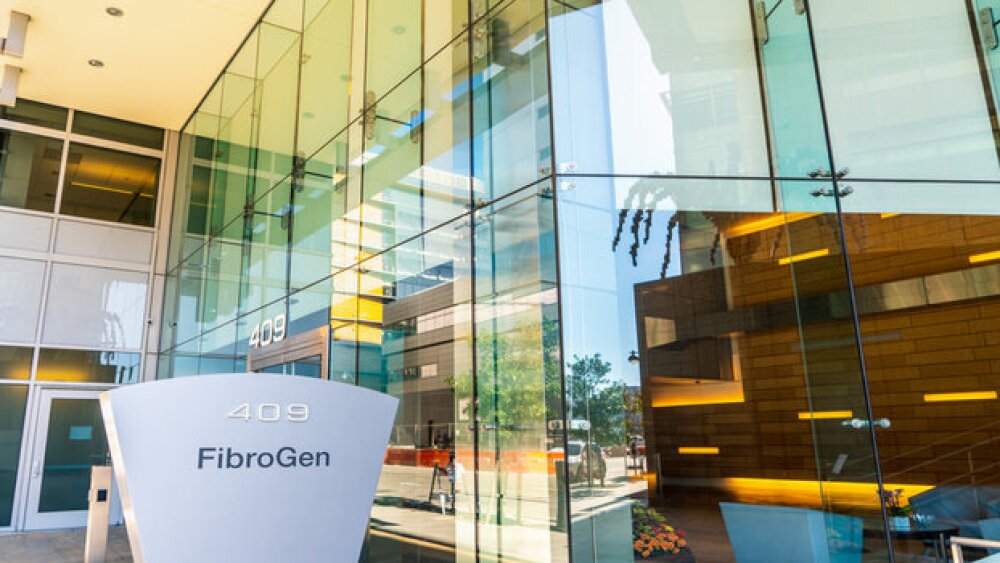The company’s pamrevlumab has failed another late-stage study in Duchenne muscular dystrophy, unable to significantly improve functional motor abilities over placebo.
Pictured: FibroGen sign at its headquarters in San Francisco, California/iStock, Sundry Photography
FibroGen announced Tuesday that its investigational antibody fell short of its primary efficacy endpoint in the Phase III LELANTOS-2 trial in Duchenne muscular dystrophy.
The company’s stocks tanked in after-hours trading in reaction to the news.
LELANTOS-2 is a randomized and double-blinded trial enrolling 73 boys with ambulatory in Duchenne muscular dystrophy (DMD) who were randomly assigned to receive either pamrevlumab or placebo. All patients also received background corticosteroid treatment. The study’s primary endpoint was the 52-week change in the North Star Ambulatory Assessment (NSAA) score, a scale used to assess functional motor abilities in children with DMD.
Topline data from LELANTOS-2 showed that pamrevlumab was unable to significantly improve the NSAA score versus placebo over 52 weeks. FibroGen’s antibody also fell short of the study’s secondary endpoints, including 4-stair climb velocity, 10-meter walk/run test, time to stand and time to the loss of ambulation.
In terms of safety, LELANTOS-2 found pamrevlumab to be generally well-tolerated and most side effects were mild or moderate in severity. Treatment-emergent serious adverse events were slightly more common in the pamrevlumab group than in the placebo arm, with respective rates of 8.3% and 2.8%.
FibroGen will continue to analyze data from LELANTOS-2 to determine the next steps for its pamrevlumab. The company will also share full results from the study at a future medical congress.
Tuesday’s Phase III failure comes as FibroGen looks to recover from a rocky second quarter. In June 2023, pamrevlumab sustained back-to-back defeats, first in DMD and then in idiopathic pulmonary fibrosis.
During the company’s second-quarter earnings report, CEO Thane Wettig named pamrevlumab as one of FibroGen’s main strategic pillars that will help it maximize value for its shareholders. At the time, pamrevlumab was still looking at three key late-stage readouts. Now, FibroGen is down to two remaining trials, both in pancreatic cancer: the Phase III LAPIS study and the Phase II/III Precision Promise Platform Study.
Aside from pamrevlumab, FibroGen is also developing roxadustat, its first-in-class small molecule inhibitor for the HIF-PH protein, indicated for anemia and chronic kidney disease in many different territories outside the U.S. In China, the drug brought in $76.4 million during the second quarter, a 44% increase in revenue from the same period last year.
The FDA has yet to approve roxadustat after it rejected FibroGen’s application in August 2021 for safety issues. The HIF-PH inhibitor failed the Phase III MATTERHORN trial in myelodysplastic syndrome in May 2023.
Beyond its two most mature molecules, FibroGen is also relying on its early-stage pipeline in oncology and strong cash position to keep the company afloat into 2026.
Tristan Manalac is an independent science writer based in Metro Manila, Philippines. He can be reached at tristan@tristanmanalac.com or tristan.manalac@biospace.com.






